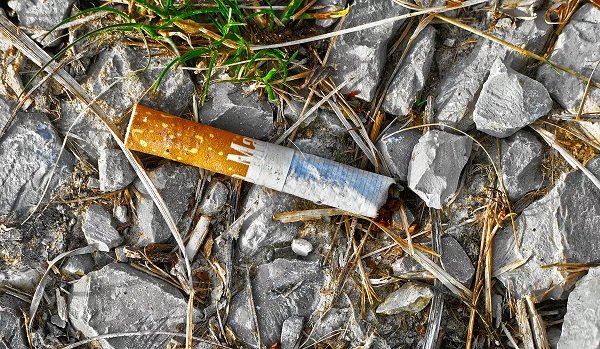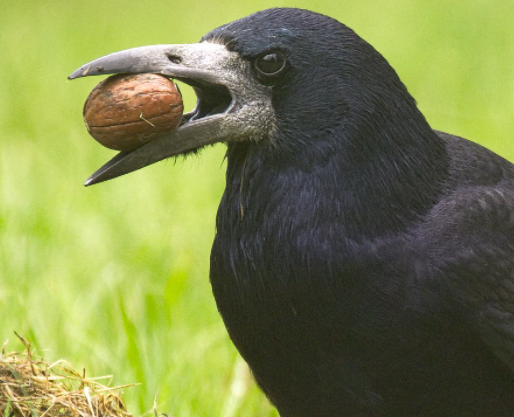Courtesy NatParks.
Here’s an interesting yet shocking fact. Every year, around one million tonnes of plastic is thrown wilfully into gutters, streets, roads and parks. Six trillion cigarettes – and their discarded butts - are smoked every year and categorised as producing the worst form of plastic pollution ever. But in one town, smart Swedish crows are helping to clean butts up. By Jeremy Torr.
Södertälje, Sweden. February 2022. Discarded butts from the trillions of cigarettes smoked worldwide every year contribute a staggering 0.8 million tons of plastic to our environment - every 12 months.
As well as looking disgusting, the material they are made of (cellulose acetate) is an artificial plastic compound, containing dozens of toxic chemicals including arsenic, lead, triacetin and obviously nicotine. And worse still, the butts linger and don’t break down like much other plastic litter.
"Anyone with a good sense of smell knows there’s (something) there." - Poppendieck. Courtesy NIST.
"If you have ever sat on a park bench when somebody next to you smoked, then they get up and leave their cigarette butt behind, that odour you smell is indicative of what (is left behind)," said researcher Dustin Poppendieck from the US National Institute of Standards and Technology (NIST). "Anyone with a good sense of smell knows there’s (something) there."
Realising that disposing properly of cigarette butt litter would save a massive amount of pollution, a number of smart thinkers have been working on effective ways to pick up all those millions of tonnes of discarded toxic waste. And some of them have come up with a bird-based solution.
“Rooks and crows have a really high neuronal density for their size,” notes ornithologist Robert Mulvihill. This means they are actually quite smart; we already know they work in teams and even use basic tools to find food. So it seemed likely they could be used as selective litter pickers.
Mulvihill and his team decided to see if they could train corvids (rooks in particular) to selectively pick up butts with their quick and agile beaks in a way that was faster and more consistent than humans could.
Working initially at Puy du Fou theme park in Les Epesses, France, then on a larger scale in Abu Dhabi, they proved the point that birds could be trained to pick up and dispose of butts if they got a reward of food. Bird trainer Alonso Malo said it became obvious that this approach could be a viable solution to what he said was “the urgent problem” of casual littering. “If the bird is able to pick up litter, why can’t humans do the same?” he asked.
Courtesy Flickr.
But the fact that birds have an estimated level of reasoning equal to a seven-year-old, keen eyesight ideal for detecting half-hidden butts, and that their beaks are just built for snatching up small things, meant they could actually work quicker and more effectively than humans. They were voted a success as butt-pickers.
As a result, activists in the Swedish town of Södertälje have tried the same approach using crows instead of Mulvihill’s parrots and rooks. The man behind Södertälje’s bird experiment, Christian Gunther-Hanssen, agrees that the birds’ innate intelligence and their ability to pass on information to other birds made them ideal for the job.
“They are easier to teach (than other birds) and there is also a higher chance of them learning from each other. At the same time, there’s a lower risk of them mistakenly eating any rubbish.” Smart birds indeed.
If the trial is a success and can be replicated on a larger scale, there is the potential not just for cleaner environments, but also for a considerable saving. It is estimated that butts make up over 60% of Sweden’s litter cleaning problem. And as the city spends around $2 million each year on clean ups, the savings could be significant. “The estimated cost of picking up each butt is around 12 cents at the moment,” said Gunther-Hanssen. “Using the crows instead could reduce this to just 3 cents.”
But crows are really not really the solution to the problem, says Tomas Thernström, from the Södertälje council; he notes the contrast between people and crows: “It is interesting that we can teach crows to pick up cigarette butts but we can’t teach people not to throw them on the ground,” he says.
As a result, the municipality has just introduced a new regulation that fines people $90 if they are caught throwing cigarette butts on the ground. With that and the crows, Södertälje should definitely be more litter-free.


